 By Staff By Staff
June 20th, 2019
BURLINGTON, ON
It had to come back at some point – and with a government that says it is Open for Business it made sense.
What the long term ramifications are – that is the unanswered question.
When you build more roads – you get more cars. That fact is not going to change.
In their media release the provincial government said:
“The Ontario government is making life easier for commuters by resuming the Environmental Assessment (EA) for the Greater Toronto Area West Corridor to improve Ontario’s highway network, reduce travel times and help alleviate traffic congestion across the GTA.
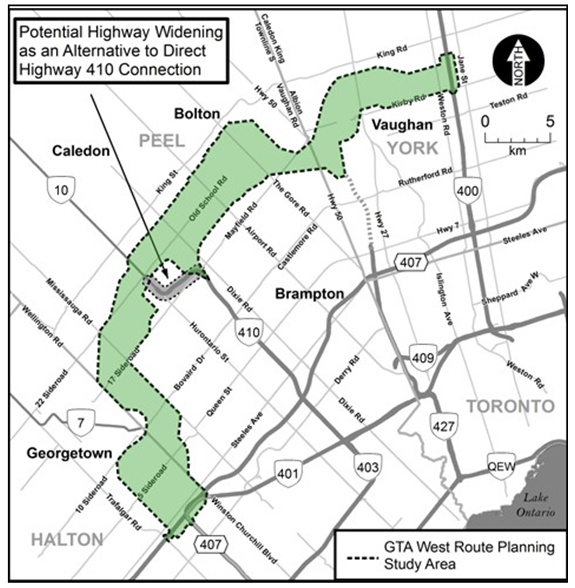 Study area. “Jeff Yurek, Minister of Transportation was joined by Amarjot Sandhu, MPP for Brampton West to announce that the government is resuming the EA at the point it left off in 2015. This comes after a motion was passed in the legislature on June 4, 2019 calling on the government to immediately resume the EA.
“”Ontario is open for business and our government will continue to invest and build new, efficient infrastructure to move people and goods faster,” said Minister of Transportation, Jeff Yurek. “Resuming the EA for the GTA West Corridor will ensure we can build more transportation infrastructure in the future that meets the needs of the people as our economy grows.”
“A Public Information Centre this fall will give the public an opportunity to review and comment on the preferred route.
“I’m pleased to see our government is listening to the needs of the region and resuming the environmental assessment for the GTA West Corridor,” said Amarjot Sandhu, MPP for Brampton West.
“As our region continues to grow this study will ensure our highways are working for businesses, commuters and families across the Greater Golden Horseshoe. While being in touch with commuters and people in the trucking industry in Brampton West, I shared their concerns with Minister Jeff Yurek, who was very kind and assured the ministry would help as much as it can to resolve the issue, which was long overdue to improve the region’s transportation network, reduce travel times and help alleviate traffic congestion in Brampton and across the GTA.”
The EA is anticipated to be completed by the end of 2022.
With the resumption of the GTA West EA, the Ministry of Transportation and the Independent Electricity System Operator (IESO) will no longer proceed with the Northwest GTA Corridor Identification Study.
In addition, the Ministry of Energy, Northern Development and Mines and the IESO have initiated a new study to identify an adjacent electricity transmission corridor to support growing demand for electricity in the western GTA. Planning today for tomorrow’s electrical needs will help avoid future costs to local electricity ratepayers.

 By Pepper Parr By Pepper Parr
June 20th, 2019
BURLINGTON, ON
Burlington, Halton Hills, Milton and Oakville will be bringing expert opinions and reports to a Federal Public Hearing on a 400-acre truck-rail hub proposed by the Canadian National Railway (CN) in the Town of Milton.
The project is currently being assessed by the Canadian Environmental Assessment Agency Joint Review Panel. The Panel will host a Public Hearing in Milton from June 19 – July 17 to hear community concerns related to CN’s proposal, including environmental effects and how it may affect local residents.
 Halton Region Chair Gary Carr. “We have been working closely with our Halton municipal partners to ensure residents’ concerns are heard. This project impacts more than rail lines – it will congest our roads, pose health risks and result in fewer jobs for the community,” said Halton Region Chair Gary Carr. “This is something that every resident and member of this community should be concerned about.”
The Halton Municipalities’ team of internal and external experts have identified significant non-rail aspects of the project that raise concerns for residents and the community. These concerns and expert opinions will be presented to the Panel during the Hearing:
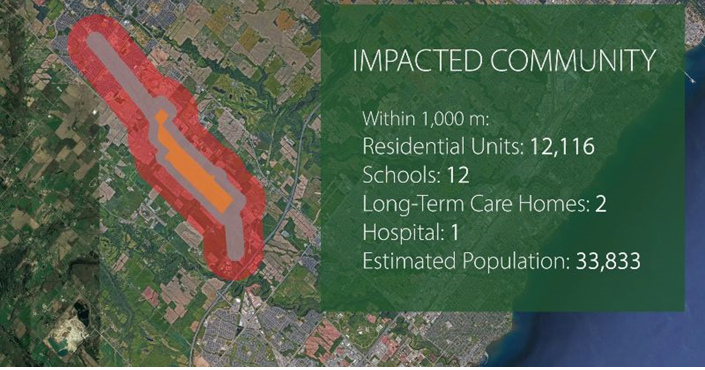
• Traffic congestion: The hub will operate 24 hours a day, seven days a week and result in 1,600 truck trips to and from the site each day. These truck routes will lead to more traffic on our roads and traffic will continue to increase as the site’s capacity grows. This congestion poses a risk to the safety of motorists, cyclists, pedestrians and families in the area.
• Health and safety: The proposed site is immediately adjacent to existing and future residential areas. Approximately 34,000 current and future residents, twelve schools, two long-term care homes and one hospital are located within one kilometer of the site. The site will generate increased levels of noise, air pollution and lighting, and significantly impact the community’s health and safety.
• Environment: Our community effort to protect the environment will be impacted by the effect of emissions, storm water discharge, water takings and watercourse alterations.
• Employment: The project will result in less serviceable employment lands and potentially fewer jobs for the Halton community. The site and the surrounding area is currently planned for 1,500 jobs and this project will only result in 130 jobs.
Additionally, CN has only revealed its plans for 400 acres on the site; they have not disclosed its plans for the remaining 800 acres. Experts have determined that the operations at this site can be significantly expanded which will further increase the impacts on residents and the community.
 Milton Mayor Gord Krantz “CN is not just asking us to support the current proposal, they’re asking us to have faith about what might come next. All the while telling us it is none of our business,” said Milton Mayor Gordon Krantz.
 Conservative Lisa Raitt is the MP for Milton “I have spent several years listening to local groups, stakeholders, and individuals on the topic of the proposed CN intermodal facility in Milton,” said Hon. Lisa Raitt, Member of Parliament for Milton. “I have weighed all the facts for and against this project and have come to the conclusion that this site is not appropriate for this type of operation.”
“I commend the many residents who have voiced their concerns about this project and thank Mayor Krantz and Chair Carr for taking the lead during the Join Review Panel presentations,” said MPP Parm Gill. “As the provincial representative for Milton, I am committed to doing everything I can to ensure those voices continue to be heard as the Joint Review Panel makes their recommendations, and theFederal Government makes their final decision on this project.”
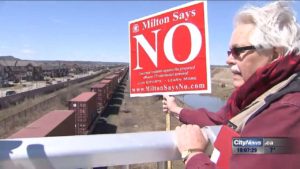 “The Halton Municipalities are encouraging residents and the community to get involved by attending the Public Hearing or watching it live, using social media to be part of the conversation or by contacting their MPP or MP to let them know their concerns about the proposed project. Residents can also provide comments on halton.ca/cn and these will be used to update the Panel.” “The Halton Municipalities are encouraging residents and the community to get involved by attending the Public Hearing or watching it live, using social media to be part of the conversation or by contacting their MPP or MP to let them know their concerns about the proposed project. Residents can also provide comments on halton.ca/cn and these will be used to update the Panel.”

 By Staff By Staff
June 20th, 2019
BURLINGTON, ON
Traffic on Brant might be a little slower on Friday, the city will be working to seal roadway cracks on Brant Street, between Lakeshore Road and Fairview Street.
Weather permitting, the work will begin at 9 a.m. until 3:30 p.m.
During this work, on-street parking will be temporarily unavailable and minor traffic interruptions are anticipated.
Parking spots will re-open as the work is completed along each section of the roadway.

 By Staff By Staff
June 20th, 2019
BURLINGTON, ON
 We Love Burlington pressed Burlington MPP for comment on why she supported Bill 108. We Love Burlington pressed Burlington MPP for comment on why she supported Bill 108.
Jane McKenna provided a detailed response that is set out below. We Love Burlington has said they will review and respond to McKenna at some later date. We expect the Mayor of Burlington might have something to say as well.
The Gazette is giving you what McKenna had to say without any comment or analysis.
 Burlington MPP Jane McKenna “I want to clarify some of the issues you have raised in your submission on Bill 108. Your underlying assumption appears to suggest the province is trying to curtail local planning authority rather than ensure the best planning outcomes. Nothing could be further from the truth. I want to be clear that the Ontario government wants to improve the local planning process to facilitate better and faster community consultation, a more open community benefits strategy that requires more local input and ensures that growth pays for growth.
“Your submission on Bill 108 and our new Affordable Housing Supply plan was one of the more than 2,000 public submissions that were considered prior to drafting the plan and supporting legislation.
“Despite your claims to the contrary, extensive consultations, in which you participated, took place in the development of the More Homes, More Choice Act, 2019. Within months of the June election, Municipal Affairs and Housing Minister Steve Clark began consultations in the development of the Ontario government’s new Housing Supply Action Plan. Minister Clark met with local Mayors at the Association of Ontario Municipalities, (AMO) conference last August in Ottawa and at the Large Urban Mayor’s Caucus of Ontario, (LUMCO) last month in Toronto. In fact, at the recent LUMCO meeting, the Minister advised that if Bill 108 passed, the Ministry would be consulting further on the Community Benefits Formula. Last week, the Minister sent a follow-up letter to all heads of Municipal Council in advance of a June 14th meeting with AMO members.
“Many organizations including the Centre for Urban Research and Land Development at Ryerson University have published research demonstrating that one of the key roadblocks to building an appropriate mix of housing in the GTHA that supports vibrant, walkable, complete communities is the land-use planning approvals process.
“In the City of Toronto, by way of extreme example, it takes on average 10 years to get a building approval. This is a system that has been mired in excessive red tape, with regulations and processes added to processes. These were often attempts to satisfy and balance the adversarial needs of the development community and neighbourhoods that are often resistant to change. Add local politics and politicians who do not vote against their constituents’ wishes in support of good planning (that has proven to be unpopular) and you have a recipe for paralysis.
“How are we to meet our responsibility to solve the very serious housing crisis that is preventing our children from being able to afford to rent or own in their home town? How are we to manage the influx of more than a million newcomers to the GTHA by 2031 if not by encouraging the private and non-profit sectors from building a variety of new housing supply through legislation?
“You complain that Burlington has lost control of land use planning. You are correct. Here’s why.
“Burlington City Council has not produced an updated Official Plan in about 25 years – since 1994. One could suggest a variety of reasons for this. More recently, as development pressures have increased, politics have no doubt played a role.
“When the planning system is clunky, expensive, time consuming, outdated and adversarial it’s time for process adjustment.
“The Province’s Growth Plan is guided by the desire to build compact, vibrant and complete communities. It does not replace local official plans, but it does provide a framework for growth that requires municipalities to update their Official Plans to ensure compliance with the Places to Grow Act. Oakville updated their Official Plan in 2009 to conform, and Milton amended their 1997 Official Plan in 2010 to meet these provincial policy changes. Burlington’s 25-year-old Official Plan doesn’t respond effectively to the growth pressures of 2019. An outdated Official Plan does not work for our communities, our children who would like to be able to afford a home in town, our investment community or our new residents. Our OP reflects a time when Burlington was 50,000 people smaller, back when the average price of a detached house was about $200,000.
“Our Official Plan doesn’t take into account the most significant changes to planning policies in Ontario’s history. That is a big part of why, more often than not, Burlington has surrendered local planning decisions to both the old OMB and new current LPAT. To take back some local control, Burlington needs to act quickly to consult with residents and adopt a new Official Plan that complies with the Places to Grow Act and will be approved by Halton Region.
“Municipal governments are expected to be accountable and adaptable to legislative and regulatory changes. Change only becomes dysfunctional when it is not effectively managed. We believe that assessing and planning for operational and financial impacts is within the capability of the City of Burlington. The municipality will decide whether to raise taxes, reduce services or increase borrowing for capital expenditures as necessary.
“We have a housing supply crisis in Ontario that is being addressed by More Homes More Choice. Our role as government is to create the conditions where home builders can build more of what communities actually need. Our plan includes changes that would make it easier to build a mix of housing – town homes, apartments, condos, single family homes – for people to rent or own. You are incorrect when you write that developers can build whatever, wherever they want.
“The GTHA – Burlington included – is the fastest growing region in Ontario and one of the fastest growing metropolitan areas in North America. Good planning is vital to creating strong healthy communities for our kids and our grandkids.
“As part of Bill 108, changes were made to the Planning Act to simplify how municipalities collect funds for community benefits like parks and daycares. Minister Clark has been clear that one of our goals in establishing the new community benefits approach is to maintain municipal revenues and ensure appropriate infrastructure to support growth.
“We want municipalities to recover similar revenues from community benefits charges to what they have collected from development charges for discounted services, density bonusing and parkland dedication. We will develop a cap that protects vital revenue streams.
“Let me be clear – the provincial government firmly believes that growth should pay for growth. In passing Bill 108, we are moving towards a system where developers, not taxpayers, fund growth.
“It is important that municipalities have the resources to support complete communities and give the public the opportunity to provide input through public consultation. This does not happen in todays Section 37 negotiations.
“In April 2018, Burlington’s Mayor said that, (under the pre-Bill 108 system) “residents don’t have a seat at the table when negotiating Section 37 Community Benefits. The Ward councilor is consulted, but also doesn’t have a seat at the table, and their input can be ignored.” Our government agrees that Section 37 was not serving the best interests of local residents. That’s why we are working to ensure there is more public input into community benefits decisions through a municipality wide community benefits strategy.
“Again, let me be clear – we are not removing any community protections. Our government will continue to consult with our municipal partners on the development of a community benefits charge that takes the politics out of planning.
“Our plan also includes changes to the Local Planning Appeal Tribunal (LPAT) – formerly the Ontario Municipal Board – and the main adjudicator of land use planning disputes in Ontario. Right now, the tribunal has a backlog of legacy cases from the old Ontario Municipal Board. A two-to-three year appeals process, at a time when Ontario is in a housing crisis – is unacceptable.
“Our estimates from the Ministry of the Attorney General show that over 100,000 housing units are caught up in legacy cases at the tribunal. That’s 100,000 desperately needed homes that can’t get built – or three years worth of construction in Ontario waiting for approval.
“Thanks to the Attorney General’s support, we are also adding 11 new adjudicators, a 45% increase, to tackle the backlog of cases in the next 18 months and prevent future backlogs.
“We’re encouraging mediation to reduce the number of cases that actually proceed to a formal hearing and we are moving towards a cost-recovery model where developers will pay more for the system.
“On the Endangered Species Act, our legislation takes a smarter approach to recover species, including new methods for protecting species at risk due to disease, fungi or invasive species.
“Currently, after an applicant looks at alternatives to avoid a species at risk and mitigates any risk their project may have on that species, they are required to develop a plan to benefit the species through actions like habitat creation. However, some species like the Butternut Tree and several bats are decreasing due to factors harder to control or mitigate such as disease, and invasive species.
“The current Act doesn’t allow the most effective path to resolve these issues. Our changes will allow applicants who have considered alternatives and put in place mitigation measures to pay a charge to the Species At Risk Conservation Trust instead of completing other onerous requirements, such as expensive field surveys that could cost $30K per species.
“This will help enable positive outcomes for species that are decreasing due to disease, invasive species or other reasons by accumulating payments and leveraging the collective resources for more strategic, coordinated and larger scale actions.
“Ontario is committed to ensuring Ontario’s best-in-class endangered and threatened species protections include advice and species’ classifications from an independent scientific committee and modern approaches to enforcement and compliance; species and habitat protections; and recovery planning.
“During the past decade of implementing the ESA, we have heard what works well and what could work better.
“The proposed changes posted on the Environmental Registry will enhance government oversight and enforcement powers to ensure compliance with the act and improve transparent notification of new species’ listings.
“Species assessment and classification decisions will continue to be made by an independent scientific committee – the Committee on the Status of Species at Risk in Ontario (COSSARO). The list of species at risk will continue to be updated automatically, based on the independent science-based assessment process.
“Ontario is also proposing to create Canada’s first independent agency to be called the Species at Risk Conservation Trust, to allow municipalities or other applicants the option to pay a charge to the Agency in lieu of completing certain on-the-ground activities required by the act.
“Applicants would still seek a permit and need to fulfill on-the-ground requirements, including considering reasonable alternatives for their activity and taking steps to minimize the adverse effects of the activity on the species at risk.
“Bill 108 is important legislation to solve one of the most pressing and urgent problems of our time – a shortage of housing stock has driven prices up making homes unaffordable for many families. With on going global urbanization Burlington, as part of the GTHA, is experiencing extraordinary development pressure as more and more young people want to live and raise their families here. We can’t stop growth but we can manage it successfully with intention and good planning.
“This is a municipal responsibility. We all love Burlington. We can watch it transform into the kind of community we want – one with a vibrant downtown, with plenty of families and couples walking and cycling to pick up fresh groceries or to meet some friends at a café. The air will be cleaner because we will be driving less, we will be healthier because we’re walking and cycling more.
“This is a long term vision. We need to extend our view 20, 30, 40 years into the future. The next generation of mobile young people are looking to live, work and play at home.
“This is legislation that is important and integral to our well being and success as a community. We have much to celebrate and I welcome divergent views and thoughtful criticism.
“Leadership and dialogue would be the most advantageous approach for the municipality and the provincial government. The people of Burlington deserve no less than our honest commitment to do the hard work necessary to solve the housing crisis in the GTHA and beyond.”

 By Staff By Staff
June 19th, 2019
BURLINGTON, ON
The Regional police have made an arrest of a robbery suspect who was riding a BMX-style bike and flashed a switchblade-style knife during two incidents.
 Back in May police responded to a report of a break and enter in the area of Shoreacres Road and Spruce Avenue in Burlington. The involved individual was located in close proximity and taken into custody. During the subsequent investigation that same individual was linked to two recent knife point robberies. Back in May police responded to a report of a break and enter in the area of Shoreacres Road and Spruce Avenue in Burlington. The involved individual was located in close proximity and taken into custody. During the subsequent investigation that same individual was linked to two recent knife point robberies.
Michael Main (27) of Burlington was charged with the below offences and held for a bail hearing:
-Trespass at night
-Assault with a weapon
-Robbery (2 counts)
-Fail to Comply Probation (3 counts)
The robberies occurred on May 19, 2019 at approximately 10:00 pm and on May 20, 2019 at approximately 1:30 am in the Appleby Line and New Street area.
Anyone who may have any additional information pertaining to this investigation is asked to contact Detective Steve Siomra at 905-825-4747 Ext: 2343.
Tips can also be submitted to Crime Stoppers “See Something? Hear Something? Know Something? Contact Crime Stoppers” at 1-800-222-8477 (TIPS) or through the web at www.haltoncrimestoppers.ca.
Persons charged with a criminal offence are presumed innocent until proven guilty in a court of law.

 By Pepper Parr By Pepper Parr
June 19th, 2019
BURLINGTON, ON
The first working day in July Tim Commisso will walk into city hall maybe wearing a new tie or a new pair of shoes to show that this is a new opportunity that he has taken on.
 Last night at the Ward 2 community meeting where Councillor Lisa Kearns used an hour to tell some of her constituents more than they will ever want to know about developments in downtown Burlington she also mentioned that in the search for a new city manager there were 70 resumes sent in; 30 of which got a close second look and six of those that were interviewed. Last night at the Ward 2 community meeting where Councillor Lisa Kearns used an hour to tell some of her constituents more than they will ever want to know about developments in downtown Burlington she also mentioned that in the search for a new city manager there were 70 resumes sent in; 30 of which got a close second look and six of those that were interviewed.
Tim Commisso was one of the 70 and one of the 30 and one of the six.
Another one of the six was invited back for a second interview.
Tim got the nod.
At the city Council meeting on Monday Tim was given an opportunity at the end of the meeting to say a few words and made mention of a phone call he got from Marianne Meed Ward to have a cup of coffee.
He said that he had no idea she was going to discuss his coming in as the Interim Manager.
Meed Ward was not an elected official when Tim was one of the General Managers with the city.
He left Burlington in 2008 – Meed Ward was first elected in 2010.
However Meed Ward was a very active citizen and she would have been very aware of the kind of work Commisso had done when he was a General Manager.
Meed Ward had decided that she would end the contract the city had with James Ridge; she may have already decided that she would approach Commisso.
Those with senior positions in the municipal world talk to each other. One Gazette contact said he had a conversation with Tim who is reported to have said he wasn’t sure if he was going to seek the job – but our contact added “he didn’t say he wasn’t going to seek the job”.
During the Kearns’ Ward 2 meeting Tuesday evening one constituent said that “at least Commisso knows where all the bones are buried”, to which another person added: “He may have buried many of those bones”.
The Gazette reported earlier that the decision to hire Commisso was not unanimous – we were misled on that matter. It appears that the decision to hire Commisso was unanimous.
Come July 1st Tim Commisso is the City Manager. During his remarks to council he said he hoped to be with the city for the duration of the five year contract.
Burlington has had difficulty keeping city managers.
The city now has a man who knows the organization, is respected and appreciated by many and is working with a Mayor who sought him out.
Meed Ward tried hard to work with James Ridge, she tried harder to develop a strong working relationship with Mary Lou Tanner when she was appointed Director of Planning. She wasn’t able to get the traction she needed with either.
Tim Commisso now has the responsibility of developing the team that is going to get Burlington through some of the very rough water ahead of us.
Good luck to both the Mayor and the City Manager.

 By Pepper Parr By Pepper Parr
June 19th, 2019
BURLINGTON, ON
Do you remember what happened to the van that the Premier wanted outfitted with a mini-fridge and a leather couch? The blow back was pretty fierce and the Premier has had to do with staff driving him about in an SUV.
 And then there was the friend that the Premier wanted to appoint as Commissioner of the Ontario Provincial Police. The blow back on that one was even fiercer. Someone else got that job. And then there was the friend that the Premier wanted to appoint as Commissioner of the Ontario Provincial Police. The blow back on that one was even fiercer. Someone else got that job.
 Buck a beer fell off the radar screen. Buck a beer fell off the radar screen.
The plans to limit the support parents with autistic children got was also changed after the public stood up and said – not for us.
The current elephant in the room is Bill 108 which threatens to cripple and have a devastating impact on how municipalities deal with the services they are expected to deliver.
We learned on Monday that Mayor Meed Ward was to take part in a conference call with the Minister of Municipalities and Housing – he is said to want to hear is what the municipalities don’t like and what they are proposing in the way of changes.
City Manager Tim Commisso was to take part in the conference call.
The Bill was introduced to the Legislature and passed and made law in less than 40 days.
The municipal sector was gob smacked, stunned and in a state of shock.
The Bill would make it close to impossible for the municipal sector to do their jobs the way they believe the public wants.
No word yet on what was said during the conference call.
But the pressure is building and we now know that this Premier will buckle – so keep up the pressure.
Summer is when the municipal politicians meet with their federal and provincial counter parts. The pressure on the provincial government at the AMO (Association of Municipalities of Ontario) conference will be immense.
Related news stories:
What Bill 108 will do to us.
Hersh on what Bill 108 could do to Burlington

 By Pepper Parr By Pepper Parr
June 18th, 2019
BURLINGTON, ON
Things do change.
There was a time during the life of the 2014-2018 Council where Councillor Sharman would lean over frequently and whisper something into Councillor Lancaster’s ear.
She tended to need a lot of guidance.
The two got along well – Lancaster listened and responded appropriately.
Then an election took place. Lancaster was not re-elected – it was close, too close for Angelo Bentivegna’s comfort and he knows he has to hustle to build the support that Lancaster had.
Sharman won – not by a huge margin; he won with 34% of the vote – and only because there were four candidates splitting the vote. The second place candidate was just 500 votes behind.
Paul SHARMAN 2,840 – 33.99%
Wendy MORAGHAN 2,336 – 27.96%
Mary Alice ST. JAMES 1,471 – 17.61%
Daniel ROUKEMA 1,319 – 15.79%
Xin Yi ZHANG 389 – 4.66%
 This is not a relaxed man – the vote count in the election explains why.  Sweating out an election campaign. Paul Sharman was a very frightened man during the election campaign. He was the only member of the old council that was returned. Meed Ward didn’t run as a Council member – she ran as Mayor and we all know how that went.
What the Gazette is observing is the dynamic Councillor Sharman lives with now. He used to have a compliant, attentive fellow council member who would listen to him.
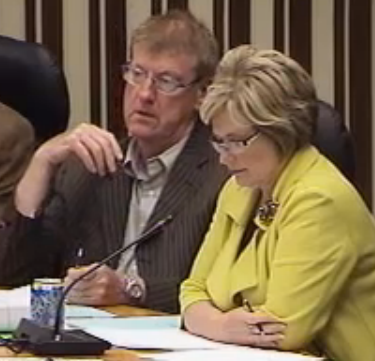 Councillors Sharman and Lancaster – both were returned in the 2014 election. Lancaster was not returned in 2018. He now has a council member that has difficulty understanding the discussion and some difficulty with the concept of nuance in many of the matters before council
Council Sharman sits to his right – often fiddling with his fingers or sitting stiffly with his arms folded across his chest.
The Gazette has the advantage of watching the council meeting via the web cast where we can see the faces of those delegating and get a closer look at the faces and the body language of the Council members.
We do miss the opportunity to meet and mix with the citizens who are in the Council Chamber. We will expand on why we have chosen not to be in the Council Chamber – sometime after July 1st.
As for Bentivegna and Sharman – the picture is worth 1000 words.
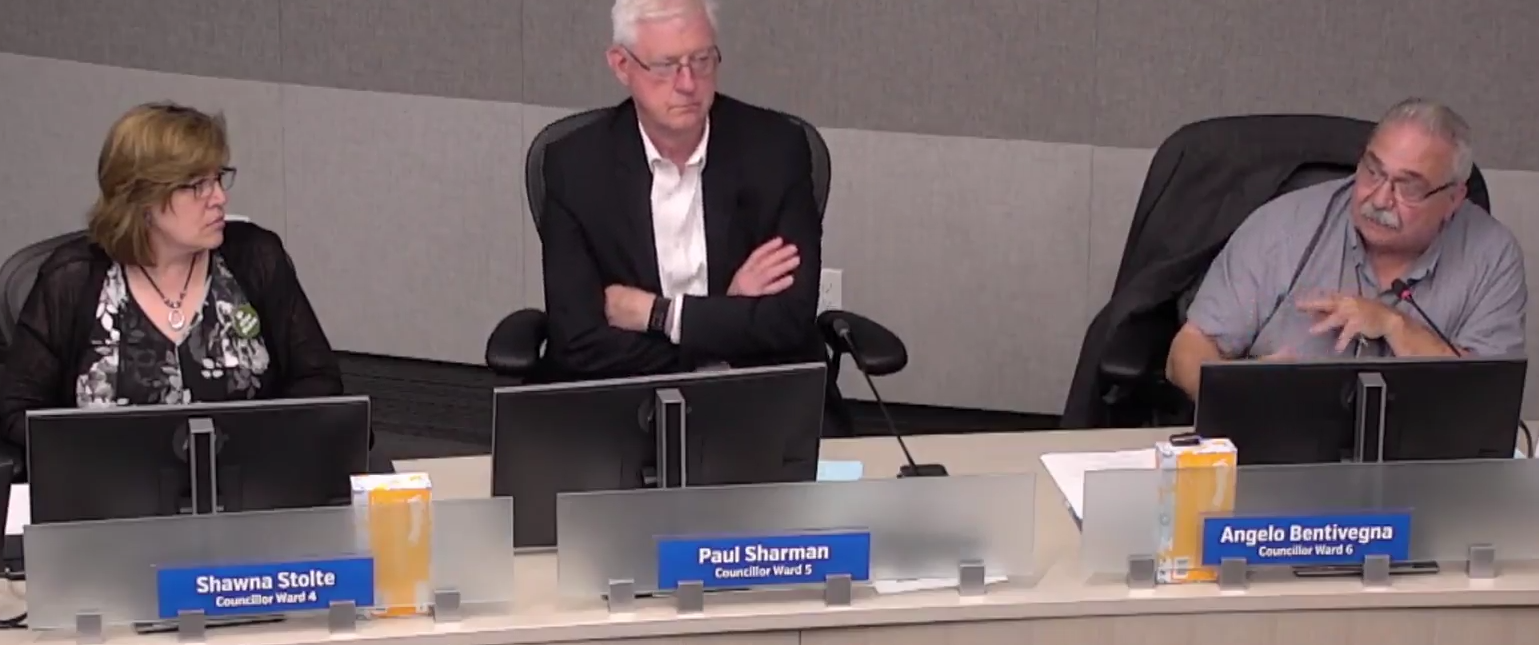 A picture is worth 1000 words. Salt with Pepper is the musings, reflections and opinions of the publisher of the Burlington Gazette

 By Staff By Staff
June 18th, 2019
BURLINGTON, ON
The Halton Regional Police want to advise you of a particular nasty bit of thievery taking place in the Region and ask for your help in identifying two suspects.
There is an increase in the number of shoulder surfing/ distraction-style thefts in Halton. The police captured images of two suspects: Do you know who they are?
On May 20, 2019, an 87 year old victim was shopping at a garden center in Burlington. Two suspects were in line behind the victim where they managed to observe his personal identification number. After following the victim to the parking lot, they engaged him in conversation about dropping some cash while at the store. The female suspect then put the “found” money into the victim’s wallet and walked away with the male suspect.
The victim returned home later discovered the missing financial cards and contacted police. The suspects immediately used the financial cards in Hamilton, Halton and Peel Region to make cash advances and retail purchases. The loss is estimated to be $3,300.

  Suspect One: Male, olive complexion, late 30’s to early 40’s, 5’4 to 5’6, medium build, 160 to 170 lbs, black beard, wearing blue jeans, tan coat, black shirt with logo, black baseball cap. Suspect One: Male, olive complexion, late 30’s to early 40’s, 5’4 to 5’6, medium build, 160 to 170 lbs, black beard, wearing blue jeans, tan coat, black shirt with logo, black baseball cap.
  Suspect Two: Female, White, mid to late 30’s, 5’4 to 5’5, thin build, 120 to 130 lbs, long hair up in a ponytail with dark roots, blonde tips, wearing a blue jacket, tan baseball cap, blue jeans, white cross body strap purse. Suspect Two: Female, White, mid to late 30’s, 5’4 to 5’5, thin build, 120 to 130 lbs, long hair up in a ponytail with dark roots, blonde tips, wearing a blue jacket, tan baseball cap, blue jeans, white cross body strap purse.
If you are able to identify the above two suspects or have any other information please contact Detective Constable Derek Gray of the Burlington Criminal Investigations Bureau – Seniors Liaison Team at 905-825-4747 ext. 2344.
Tips can also be submitted to Crime Stoppers “See Something? Hear Something? Know Something? Contact Crime Stoppers” at 1-800-222-8477 (TIPS) or through the web at www.haltoncrimestoppers.ca.
Police are reminding the public to make efforts to protect their (PIN) Personal Identification Number for their financial cards when making payments at merchants and using Automated Teller Machines.
Several different suspects have been approaching victim’s in retail parking lots and using some method of distraction theft to engage the victim in conversation such as: “returning money the victim allegedly dropped, or looking for the hospital or some vehicle mechanical issue”. The suspects then either pick pocket the victim’s financial cards or steal their wallets from their vehicles while the victim is distracted. When the theft is completed, the suspects then have the victim’s financial cards with the matching Personal Identification Number and proceed to go on a shopping spree with the victim’s financial cards.
People charged with a criminal offence are presumed innocent until proven guilty in a court of law.

 By Pepper Parr By Pepper Parr
June 18th, 2019
BURLINGTON, ON
It boils down to a mindset – if you really want to – you can. Others have done it and done it very well.
Burlington isn’t there yet.
Last week we did a short piece on “open government” and mentioned that it is possible to reach someone who can answer your questions at the provincial level.
One of our readers did a little looking around and found that – Yes you can!
“I clicked around the Provincial staff directory, how impressive – it CAN be done. It HAS been done. It IS being done.
“That got me to then look at City of Toronto …
https://www.toronto.ca/city-government/accountability-operations-customer-service/city-administration/
 The city held a Civic Action Lab a number of weeks ago asking what people wanted in the way of access to staff and information. “Clicking around from this link opens up all sorts of things, including staff names, titles, emails, phone numbers, a detailed description of City Manager, a place to lodge complaints to City Manager, on and on it goes, easy, clear and open. If you didn’t know which person you wanted to talk to, you’d be able to figure it out.
Another reader chimed in with: “Last year as part of some campaign research, I did an open government analysis that used websites as an organizations proxy. I called Toronto the “gold standard”. It actually has an “open government” project that is leading edge.
“If you want an example that is very good and closer to home, look at Hamilton’s website – has many of the same features as Toronto. When an organization is truly open and transparent, there is no place to hide. Amazing what it does for accountability and performance..
Burlington has named the new city manager. City Council chose Tim Commisso who has been serving as the Interim City Manager. He takes up the full time job July 1st.
Commisso has worked for the city of Burlington before. He was with the city for 20 years before heading to Thunder Bay where he was city manager for seven years.
One of the projects he oversaw was the early stages of the decision to build a Pier and the renovation of what became known as the Paletta Mansion. Not particularly inspiring projects to put on the resume.
A majority of council bought what Commisso said he could do for the city – we understand the decision was not unanimous.
There was an item on the June 10th, Closed Session portion of the Committee of the Whole agenda labelled Confidential City Manager’s office report regarding a letter of understanding.
Did it relate to the decision to take Tim Commisso on full time – no way of knowing – it was a closed session.
Which brings us back to “open government”. If this is what the public wants – they are going to have to push to get it. The administration certainly isn’t in any hurry to open everything up.
How do the members of Council feel?
Let’s ask them?
Related new stories:
Reaching the right person at the provincial level
How did information move in Thunder Bay. Was there a policy of Open Data?

 By Staff By Staff
June 18th, 2019
BURLINGTON, ON
There is nothing worse than waking up to the smell of smoke and realizing your home is on fire or walking into the kitchen and seeing something on the stove that is ablaze.
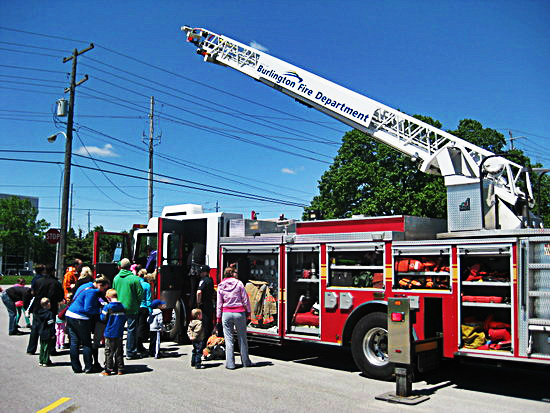 The Burlington Fire department has an active community Outreach program to educate and let the public see the equipment they use. Most people don’t have a fire extinguisher at hand – they panic and call 911.
Most people don’t have an evacuation plan.
Most people don’t expect there to be a fire in their home.
The Burlington Fire department takes the view that nothing is more important than your safety. That’s why the Burlington Fire Department has created The Steps to Safety Home Visit Program.
Burlington firefighters will be visiting homes across the city this summer and fall to talk with homeowners about how residents can be safe at home.
Part of the visit includes a voluntary in-home safety assessment to make sure Burlington homes are protected by working smoke and carbon monoxide alarms.
Understanding how to prevent fires from happening, having a home escape plan and being prepared for an emergency—big or small—are all essential steps to protecting what matters most.
Protect what matters most by following four simple steps to safety:
1. Prevent it – Stop fire and life safety emergencies before they start.
2. Protect it – Safeguard your home and family with smoke and carbon monoxide alarms.
3. Create it – Make a family escape plan.
4. Build it – Put together a 72-hour emergency kit.
 Fire Chief David Lazenby with a citizen who was rescued by firefighters at a swimming incident. Why participate in the program?
• Peace of mind that your home and family are protected by working smoke and carbon monoxide alarms as required by law.
• Meet firefighters from your neighbourhood fire station and ask safety questions.
• Learn how to stop fires from happening and what to do if there’s an emergency.
While participating in this program is optional, having working smoke and CO alarms is not. It’s the law that every home in Ontario must have:
• A smoke alarm on every level and outside all sleeping areas in your home.
• A carbon monoxide alarm next to all sleeping areas in any home with a fuel-burning appliance (i.e. natural gas, oil burning furnace, water heater, etc.) and/or an attached garage.
Know that smoke and CO alarms expire after 10 years, regardless of power supply. To determine how old an alarm is, check the side or back of the unit for an expiry date or date of manufacture.
The Burlington Fire Department has an Alarm Assistance Program (AAP) for homeowners over the age of 65 or residents with a disability that prevents them from maintaining their home’s smoke and carbon monoxide alarms. This program is for people with no support network or agencies available to assist. To learn more, visit: www.burlington.ca/AAP

 By Pepper Parr By Pepper Parr
June 18th, 2019
BURLINGTON, ON
The Official end of a sad story – one that cost the city of Burlington a bundle and grief to three citizens and some pain to the Burlington Gazette.
Back in 2010 when the Gazette first broke the story of trucks hauling land fill onto the Air Park property, the public learned that there was no permit to put the land fill on the site; there was no site plan filled and for a period of time no one was quite sure where the fill had come from.
The city sued, the Air Park owners sued and a couple of years later it all ended up with the city losing a critical appeal and the decision by council not to take it any further.
 50,000 tonnes of landfill were dumped on the Air Park property – without the required permits. The 50,000 tonnes of landfill are still in place, Barbara Sheldon still can’t see much outside her kitchen window other than a pile of earth that should not be there. The value of her property is considerably less than it was the day the first truck arrived.
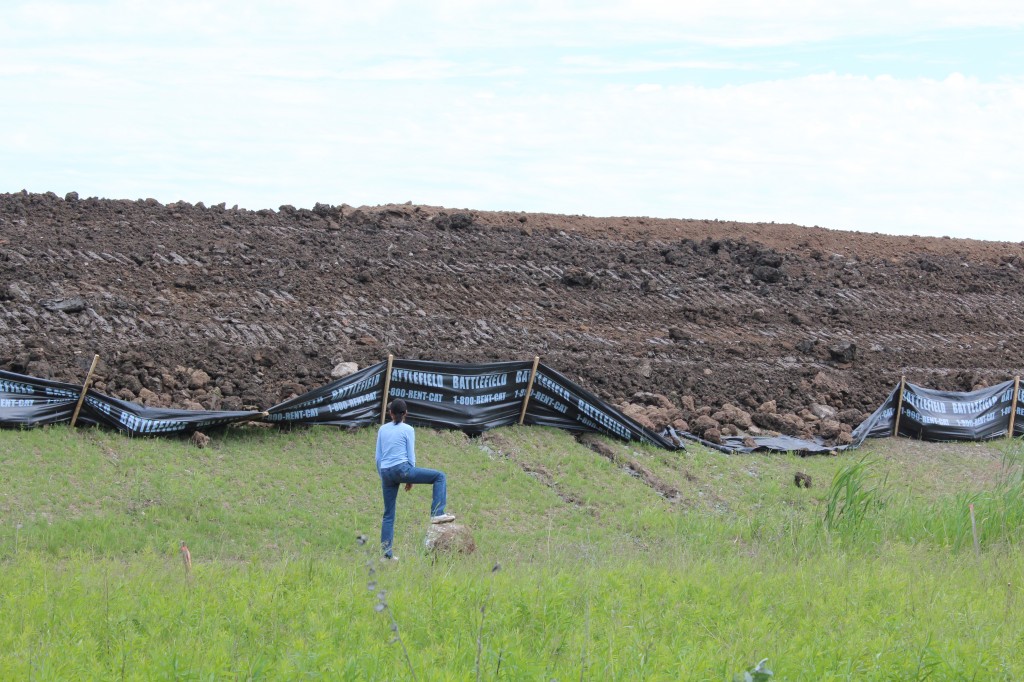 Barbara Sheldon stares up at the small hill of landfill that has been dumped on the property next to hers. The Mayor at the time look at the earth; said this is intolerable and drove back to his office. Nothing was done to make things right for Sheldon.
The Gazette, the Gazette publisher, Vanessa Warren and Monte Dennis were sued for $100,000. Years later the case was xx without costs. The document saying so is set out below.
We got his notice from the lawyer representing the Air Park on Friday of last week:
“For reasons I do not understand, the court in Brampton misplaced the order Justice Daley signed on October 30, 2018 before it was entered. One of our assistants has been following up with the Court, and the document was finally found and entered. I attach a copy of the entered order for your files.”
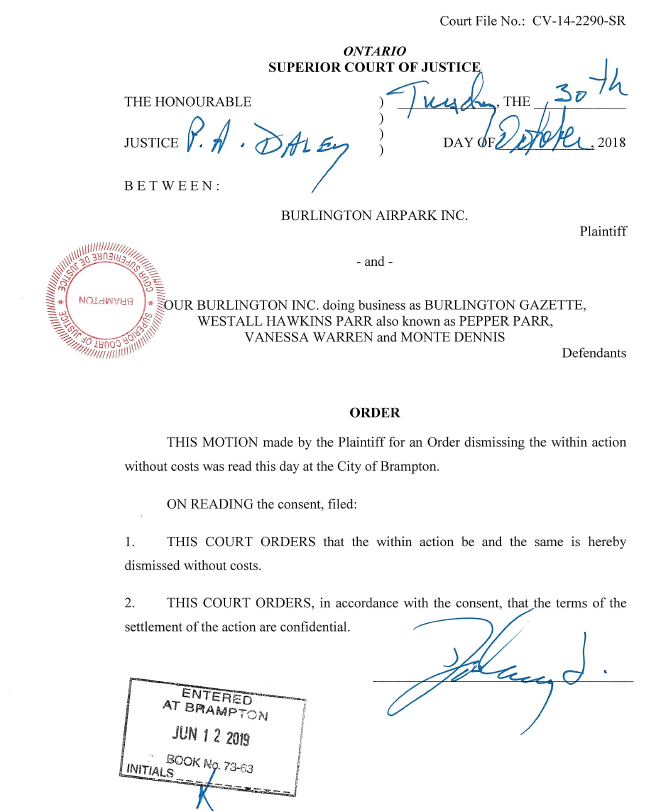 The final word – on a sad part of Burlington’s history. There was some satisfaction in knowing that we weren’t wrong; all the details are wrapped up in a cloak of silence. A way was found for the Air Park people to use a specific document to slip out of the bind they had gotten themselves into when they sued; they were able to walk away with nothing but their own legal costs to bear.
Dennis, Warren and Parr had to suck up their own costs.
 Vanessa Warren did a superb job of pulling together the evidence to support the defence argument that there was no libel committed. Vanessa Warren proved to be a champion at pulling data together – the photo tells that story.
Maybe there is a movie or a television series in all this. It could include the buzzing of Dennis’s home by a helicopter late at night, the obfuscation and the damage done to a property owner.
 Vince Rossi, president of the Burlington Executive Air Park. At some point someone somewhere will want to do something with the Air Park. The current ownership is the stumbling block to anything reasonable being done.
There is considerable benefit to having an airport in the Region. Just don’t tell the Premier, he will want to allow the owner to exercise the right for an urban boundary expansions. If you think that is a stretch take a look at the development proposal for 29 stories on Lakeshore at Pearl.
Where there is major money to be made and lawyers who are crafty and creative – putting the two together produces some astounding results.
Progress!

June 17th, 2019
BURLINGTON, ON
City of Burlington Announces City Manager
Burlington City Council is pleased to announce that after an extensive search and recruitment process it has appointed Tim Commisso as City Manager effective July 1, 2019. Tim has been Interim City Manager since January 2019.
The search for a permanent City Manager began in the new year and was an open and transparent process led by the city’s Director of Human Resources and Legacy Partners Executive Search, with all members of Council acting as the Selection Committee. Tim was the successful candidate among all the applicants and the decision was supported by all members of Council.
Each applicant for the City Manager position was involved in a staged screening and interview process: A total of 80 applications were received and shared with Council; the applicants were then screened by the Director of Human Resources and Legacy Partners to 12 from across the country; six applicants were then interviewed by Council. A management assessment tool was also utilized to assist in the final decision. Tim was the preferred choice of all members of council.
Prior to his role as the Interim City Manager Tim was a Senior Advisor at MNP, a national accounting, tax and business consulting firm.
Having served ten councils and eight mayors, Tim has extensive knowledge and experience in municipal government, strategy development, organizational effectiveness and performance, economic development and change management. Tim holds a Chartered Professional Accountant (CPA) designation and obtained his Master of Business Administration (MBA) from Wilfrid Laurier University.
Tim worked for the City of Burlington for 20 years holding various senior leadership roles including General Manager positions in Community Services and Development and Infrastructure, Director of Parks and Recreation and Deputy City Treasurer.
During his time in Burlington, Tim was at the forefront of community development and engagement. Tim was responsible for major community projects with resident involvement such as the Downtown Waterfront project, the Appleby Ice Centre and Paletta Park and Mansion. Tim was also the project lead on Financial Management System and the facilitation of the Strategic Plan.
Having worked in the public sector, Tim also brings many years of knowledge and experience in intergovernmental affairs. Tim’s most recent municipal experience was serving as the City Manager in Thunder Bay for 7 years from 2008 to 2015.
Mayor Marianne Meed Ward
“On behalf of Burlington City Council, I want to congratulate Tim on his new position. After an extensive recruitment process which began in the new year, Tim was the clear choice among members of Council for his steady hand, strategic approach and guidance throughout this transition period. In the six months that Tim has been Interim City Manager he has played a crucial role in moving many of Council’s strategic needs and priorities forward including the creation of a four-year Council Work Plan. It’s great to have Tim back at the City of Burlington; and he has already hit the ground running to serve our community.”
Interim City Manager, Tim Commisso
“I am honoured and feel very privileged to have been selected by City Council to serve the citizens of Burlington as City Manager. I’m also looking forward to continue working with the dedicated staff at the City of Burlington who provide incredible public services to residents.”
Related opinion piece:
The past is a good indication of the future.

 By Pepper Parr By Pepper Parr
June 17th, 2019
BURLINGTON, ON
City council will meet this evening and pass bylaws making legal the numerous recommendations that were made at the Standing Committee and Committee of the Whole level.
They will decide how pan handling is going to be handled.
There were some interesting differences of opinion during the debate on this issue. The Mayor had no problem with people pan handling – they have a right to do so as long as they are not standing on roadways and interfering with the flow of traffic.
Ward 3 Councillor Rory Nissan wanted things to further than that – however Inspector Ivan L’Ortie, the senior officer at the Burlington unit of the Halton Regional Police explained that there really isn’t much the police can do. “We try to offer people who feel they have to beg to get the funds they need to live as much help as we can and there have been a few occasions where we have been able to make a difference. But if people want to pan handle – here isn’t much we can do.”
Mayor Meed Ward wanted to know if the city had a No Loitering bylaw; they don’t.
What became clear during the debate was that if people in Burlington want to put an end to pan handling all they have to do is stop giving the pan handlers any money.
Once they realize that there is nothing for them – they will stop.
Most of the pan handlers are not Burlington residents – they are people from the Hamilton area who seem to know a good thing when they see it. The people of Burlington are prepared to open their hearts and open their wallets and help them out.
The best way to help them out is to direct them to agencies that can support then to move onto a more secure life style.
Staff reported that a survey of other municipalities showed that none have pan handling bylaws – some try to do some educating.
 Will Burlington see signs like this? It seems to be the only option available. Ward 4 Councillor Shawna Stolte went on line during the meeting and came back with a sign being used in Wainsboro, Virginia.
The feeling seemed to be that the residents can put a stop to the pan handling by refusing to give money.
Council decided to leave the task of creating an education program for the public – which is likely to include signs at some of the more popular pan handling locations urging the public to donate to the charities in place to help these people.
A report will come back to Council in September – assuming the recommendation gets approved this evening.

 By Pepper Parr By Pepper Parr
June 17th, 2019
BURLINGTON, ON
While Burlington figures out just how it wants to communicate with its residents a reader popped us a note saying it is all about Open Government and Open Data.
 “Pepper – we were talking about ‘open government’ and organizational transparency as an element of accountability. I have attached a link to the provincial government directory. It continues to evolve, of course, but a version has been in place for over 20 years. They don’t need to create ‘best practices’ in Burlington, they can simply adopt or adapt them.” “Pepper – we were talking about ‘open government’ and organizational transparency as an element of accountability. I have attached a link to the provincial government directory. It continues to evolve, of course, but a version has been in place for over 20 years. They don’t need to create ‘best practices’ in Burlington, they can simply adopt or adapt them.”
The Gazette has found that Burlington has never been very keen on giving citizens direct access to staff. Provincial government does it – they’ve been doing so for more than 20 years.
Try it out – the link is there for you.
https://www.infogo.gov.on.ca/infogo/home.html

 By Penny Hersh By Penny Hersh
June 17th, 2019
BURLINGTON, ON
BILL 108 – It is a definite “wake-up” call for Municipalities. I am probably in the minority, but perhaps it is needed. I have watched the Planning Department not be able to process an application in 210 days – WHY! Some of the answers provided by some city planners were “we had an understanding with some developers to allow us to work together and not be concerned about the time frame”. Is this the way to do business?
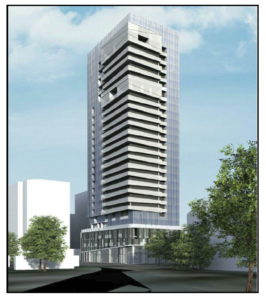 The ADI Nautique development on Lakeshore at Martha, I guess not because the City has been taken to the OMB/ LPAT for non-decision and with regard to the ADI Development on Lakeshore/Martha failed to defend its position. I doubt that ADI ever expected to get 26 storeys on that site.
The claim that the new 120 days does not give Municipalities enough time – perhaps the process the planning department is using is flawed. Why meet, as we have been led to believe, individually. Have all the players in the room at the same time – and have an understanding of who has to do what with definite time frames.
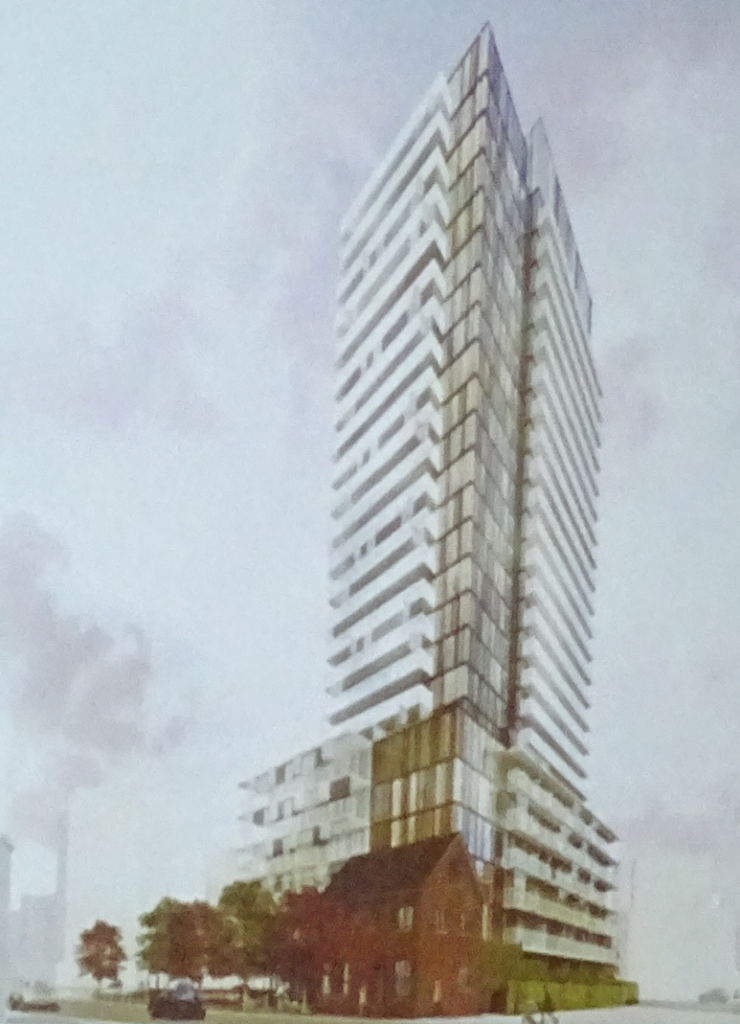 The sky appears to be the limit for a proposed development on Old Lakeshore Road across from Emmas Back Porch. Note the scale with the two storey heritage structure that the developer proposes to keep. What I have heard at Council Meetings from the planning department is that the wind, the shadow, the parking , and transportation studies etc. have all been completed and the development application is “good to go”. Every development application is taken as a one off – not looking at the other three applications in the same area that are asking for the same if not more.
Try walking on Lakeshore across from the Bridgewater Development – we now deal with a wind tunnel that on days makes it almost impossible to walk. We have traffic congestion on Lakeshore Road when at certain times there are long lines of cars trying to get off of Lakeshore ( and there are no accidents anywhere), and Bridgewater is not completed. Potential owners have been told that their move in date is now June 2020. Residents get to look at this unfinished construction for yet another year. ADI is scheduled to start construction on the 26 storey condo on Lakeshore/Martha shortly. All those studies and we are dealing with a canyon effect on Lakeshore with only one development partially completed, and not occupied.
We have insufficient parking for condominium owners and their guests. Anyone who cycles along Lakeshore and in the downtown takes their lives in their hands. Sharrows on narrow streets do not provide a safe place for cyclists. New developments with less retail space does not make Burlington the “most livable , etc. city” that is always being touted. We have enough nail and hair salons, we need retail that will keep people from using their cars.
 We have a public transportation system that does not meet the needs of the residents and certainly will not prevent people from using their cars. Free transportation from 9-2:30 Monday-Friday for seniors, while a nice thing to offer, is not the answer. It is a band aid approach to a more serious issue. Did you know that if someone takes a Handi-van into Hamilton, they have to change vans and get on a Hamilton Handi-Van to complete the journey? People who are eligible to use the Handi-Van have mobility and other medical conditions – and they have to change vans in all kinds of weather. Municipalities should have been working together, but they have not. We have a public transportation system that does not meet the needs of the residents and certainly will not prevent people from using their cars. Free transportation from 9-2:30 Monday-Friday for seniors, while a nice thing to offer, is not the answer. It is a band aid approach to a more serious issue. Did you know that if someone takes a Handi-van into Hamilton, they have to change vans and get on a Hamilton Handi-Van to complete the journey? People who are eligible to use the Handi-Van have mobility and other medical conditions – and they have to change vans in all kinds of weather. Municipalities should have been working together, but they have not.
Is it really the responsibility of a developer to provide affordable housing? Perhaps Burlington should have used the money they spent on the Pier to provide some affordable housing? It’s all about priorities and “legacy projects”.
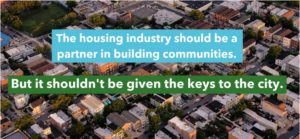 For a few years I have said that the OMB/LPAT has to go. I now question if all Municipalities are able to act alone to meet Provincial Mandates. Developers are in the business to develop. It is the responsibility of Municipalities to have in place an Official Plan that meets the mandates of the Provincial Government. Some municipalities seem to have done this. It seems, unfortunately, that Burlington has not, and I question if any new Official Plan that is passed will stand the test. For a few years I have said that the OMB/LPAT has to go. I now question if all Municipalities are able to act alone to meet Provincial Mandates. Developers are in the business to develop. It is the responsibility of Municipalities to have in place an Official Plan that meets the mandates of the Provincial Government. Some municipalities seem to have done this. It seems, unfortunately, that Burlington has not, and I question if any new Official Plan that is passed will stand the test.
We are ill-prepared to deal with what is coming down the road, and complaining and blaming others is definitely not the answer. Things have changed.
Get your house in order. Hire people who can do the job, and get rid of those who cannot. This is how business operates in the real world.
 Penny Hersh was part of the driving force that created ECoB – Engaged Citizens of Burlington. She serves at the co-chair of ECoB Penny Hersh was part of the driving force that created ECoB – Engaged Citizens of Burlington. She serves at the co-chair of ECoB

 By Staff By Staff
June 16th, 2O19
BURLINGTON, ON
Late late Friday evening – the 14th the Regional Police responded to a collision on Derry Road, west of Guelph Line.
 A westbound sport utility vehicle, driven by a 72 year old Burlington resident, turned left across the path of an eastbound motorcycle, driven by a 54 year old Hamilton resident. A westbound sport utility vehicle, driven by a 72 year old Burlington resident, turned left across the path of an eastbound motorcycle, driven by a 54 year old Hamilton resident.
The motorcycle rider was thrown from his motorcycle to the roadway and suffered fatal injuries. He was pronounced deceased on scene. The female driver of the sport utility was uninjured.
The Collision Reconstruction Unit attended the scene and assumed responsibility for the investigation.
Any witnesses who haven’t spoken to police are urged to call (905) 825-4747 extension 5065.
A traffic fatality took place in Burlington on Thursday afternoon at the intersection of Guelph Line and Mount Forest.

 By Staff By Staff
June 16th, 2019
BURLINGTON, ON
CATCH (Citizens at City Hall) uses transcripts and/or public documents to highlight information about Hamilton civic affairs that is not generally available in the mass media. The Gazette has republished one of their reports that is relevant to Burlington.
The Citizens at City Hall in Hamilton are shouting as loudly as those in Burlington and across the province over a piece of legislation introduced in May and made law in June – an astounding pace for any government. Bill 108 has upended planning at the municipal level.
It “came out of nowhere”, changed thirteen statutes, and was pushed through the provincial legislature so fast that city staff could only tell councillors after the fact about the multiple problems it imposes.
Dubbed by the Ford government “the more homes, more choice act”, Bill 108 upends Hamilton’s downtown secondary plan, imposes severe challenges for municipal efforts to rationally plan and pay for growth, and makes it more difficult for citizens to challenge new development.
“The winners appear to be land developers and speculators who can avoid the current comprehensive land planning process and have been given new rights to push for urban boundary expansions. Burlington’s mayor describes it as “welfare for developers” and an analysis by Environmental Defence found it largely aligns with the requests made to the province by the Ontario Home Builders Association.
“The legislation was introduced on May 2, with a comment deadline of June 1. It was finalized two days later and will likely be imposing planning nightmares by early July when city staff expect to be inundated with developer attempts to expand the urban boundary.
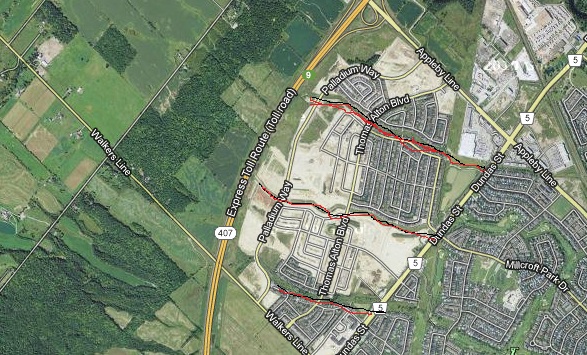 Burlington’s Urban-rural boundary was Dundas – when the 407 Hwy was created that boundary got shifted. Will Bill 108 allow additional boundary shifts? “The legislation tears up the long-standing rule that only municipal governments can propose an urban boundary expansion and only with detailed justifications. Under Bill 108, expansions of up to 40 hectares can now be applied for by individual landowners at any time and must be decided on by council within a much reduced time-frame that will be very difficult to meet.
“Official plan amendments, for example, now must be decided within 120 days of being submitted by a private developer instead of 180 days, and zoning changes must be finalized within 90 days. Failure to meet these deadlines allows the developer to bypass council and appeal directly to the provincial tribunal.
“Staff told Councillors last week that they had asked for longer periods to adequately respond but were unsuccessful. So it will now be much harder for city planners to assess developer proposals, undertake traffic and other studies, receive input from other city departments and commenting agencies, consult with the public in affected communities and then make a recommendation to council within the timeframes. And multiple developer proposals will likely arrive at the same time.
“We could have multiple 39.5 hectare applications all being submitted more or less simultaneously and then trying to figure out how to deal with all of those applications,” warned Hamilton’s chief planner Steve Robichaud. “We could have everybody applying individually and I think that is what will happen. As soon as the first person comes in, the rest will want to start piling on.”
“Among many other changes “it means the matters that were worked out with community in terms of the downtown secondary plan bonusing – that’s gone by the wayside,” Robichaud told councillors.
“That’s partly because of the severe limits that have been put on the use of the inclusionary zoning that allows cities to require affordable units in new residential developments. These were demanded by citizens last year and acceded to by the city for the full downtown, but now will be limited to major transit stops such as the proposed LRT.
“Councillor Whitehead asked staff if the province had explained why it was shortening the timeframes, and was told that no justification has been provided. Whitehead predicted there will be “a lot more cases that will bypass the democratic process and go straight to appeal”.
“Those appeals will no longer give deference to council positions. And residents registering to participate in the appeal hearings will no longer be permitted to speak at the tribunals, but only submit written statements. There’s also a reference to different fees for “different classes of persons” but no explanation of what this means.
“The changes to the Planning Act alone overturn many of the reforms of the last 15 years, including reversing the changes to the Ontario Municipal Board adopted in 2017 after nearly two years of consultations. “
 has Bill 108 put parts of the Escarpment at risk? From a Burlington perspective you can bet developers are looking at the 40 hectare boundary expansion that is now permissible and wondering how it can be applied to land north of the 407 Dundas border that has kept the escarpment safe.
These border expansions can now be applied for by individual landowners at any time and must be decided on by council within a much reduced time-frame that will be very difficult to meet.

 By Staff By Staff
June 15th, 2019
BURLINGTON, ON
Be prepared to be mesmerized by the brilliant colour combinations of the iris collection at the Royal Botanical Gardens’ (RBG) Laking Garden – they are at their peak bloom.
 Royal Botanical Gardens’ (RBG) Laking Garden Visitors can also explore the peony collection and perennial borders while enjoying live entertainment, guided tours, and presentations at the RBG Discovery Cart.
“You really have to come to RBG and immerse yourself in this collection to gain a full sensory experience that iris can provide,” said RBG Curator of Collections, Alex Henderson. “We have over 1,000 iris displaying an array of brilliant colour and the fragrance is truly captivating.”
Planted in 1947, the iris collection was RBG’s first herbaceous collection of importance with the main focus on tall bearded iris. There are approximately 250 species of wild iris found around the world and several are planted here.
 Set on a fertile terraced plain, formerly a market garden, the site is home to RBG’s herbaceous perennial collections. The name iris derives from Greek meaning rainbow, referring to the wide variety of flower colors found among the many species and cultivars. RBG’s collection includes award-winning bearded iris and hundreds of others including miniature bearded, dwarf bearded, intermediate bearded, border bearded, tall bearded, Siberian, spuria and wild species iris.
The garden also features a broad selection of tree and herbaceous peony cultivars, as well as several ancestral wild species. The Greeks referred to peonies as ‘the Queen of all herbs’ while the Chinese considered them ‘the King of all flowers’. Over time, peonies have been used ethno-botanically as a medicinal plant, as a spice, for making tea, as a perfume and the seeds were even used as jewelry.
Peonies are divided into three groups. Herbaceous peonies, which die back to the ground each winter, Tree peonies, which are one- to two-metre tall woody shrubs that bloom ahead of their herbaceous cousins, and the latest introduction of Intersectional (Itoh) hybrids, a cross between the two. The herbaceous peony collection is predominantly on the lower terrace near the gazebo while tree peonies are found on the upper terrace.
RBG’s Laking Garden (located at1260 Spring Gardens Road, Burlington) is set on a fertile terraced plain, formerly a market garden, and is home to RBG’s herbaceous perennial collections. The belvedere at the end of the path offers a panoramic view over the entire garden.
This garden, overlooked by a small cottage, offers the visitor an insight into the depth and breadth of perennial plants.

 By Staff By Staff
June 14th, 2019
BURLINGTON, ON
 At approximately 1:44pm on the 14th of June 2019 the Halton Regional Police Service received information of a motor vehicle collision that occurred on Mount Forest Drive just east of Brant Street in the City of Burlington. At approximately 1:44pm on the 14th of June 2019 the Halton Regional Police Service received information of a motor vehicle collision that occurred on Mount Forest Drive just east of Brant Street in the City of Burlington.
The initial investigation has revealed that a Honda Civic was eastbound on Mount Forest Drive from Brant Street when it mounted and crossed the center median and entered westbound lanes. It then mounted the north curb and entered the parking lot of a plaza on the north side of Mount Forest Drive where it struck two parked vehicles.
The 65 year old male driver from Burlington was taken to Joseph Brant Hospital by Halton Region Paramedic Services where he was pronounced dead.
Due to the severity of the outcome, the Collision Reconstruction Unit has taken carriage of the investigation. The road was closed for approximately four hours for the at-scene investigation.
Any witnesses who have not yet spoken with police are asked to contact the Collision Reconstruction Unit at 905-825-4747 ext: 5065.

|
|
 By Staff
By Staff


















 “The Halton Municipalities are encouraging residents and the community to get involved by attending the Public Hearing or watching it live, using social media to be part of the conversation or by contacting their MPP or MP to let them know their concerns about the proposed project. Residents can also provide comments on halton.ca/cn and these will be used to update the Panel.”
“The Halton Municipalities are encouraging residents and the community to get involved by attending the Public Hearing or watching it live, using social media to be part of the conversation or by contacting their MPP or MP to let them know their concerns about the proposed project. Residents can also provide comments on halton.ca/cn and these will be used to update the Panel.”

 We Love Burlington pressed Burlington MPP for comment on why she supported Bill 108.
We Love Burlington pressed Burlington MPP for comment on why she supported Bill 108.

 Back in May police responded to a report of a break and enter in the area of Shoreacres Road and Spruce Avenue in Burlington. The involved individual was located in close proximity and taken into custody. During the subsequent investigation that same individual was linked to two recent knife point robberies.
Back in May police responded to a report of a break and enter in the area of Shoreacres Road and Spruce Avenue in Burlington. The involved individual was located in close proximity and taken into custody. During the subsequent investigation that same individual was linked to two recent knife point robberies.
 Last night at the Ward 2 community meeting where Councillor Lisa Kearns used an hour to tell some of her constituents more than they will ever want to know about developments in downtown Burlington she also mentioned that in the search for a new city manager there were 70 resumes sent in; 30 of which got a close second look and six of those that were interviewed.
Last night at the Ward 2 community meeting where Councillor Lisa Kearns used an hour to tell some of her constituents more than they will ever want to know about developments in downtown Burlington she also mentioned that in the search for a new city manager there were 70 resumes sent in; 30 of which got a close second look and six of those that were interviewed. And then there was the friend that the Premier wanted to appoint as Commissioner of the Ontario Provincial Police. The blow back on that one was even fiercer. Someone else got that job.
And then there was the friend that the Premier wanted to appoint as Commissioner of the Ontario Provincial Police. The blow back on that one was even fiercer. Someone else got that job. Buck a beer fell off the radar screen.
Buck a beer fell off the radar screen.






 Suspect One: Male, olive complexion, late 30’s to early 40’s, 5’4 to 5’6, medium build, 160 to 170 lbs, black beard, wearing blue jeans, tan coat, black shirt with logo, black baseball cap.
Suspect One: Male, olive complexion, late 30’s to early 40’s, 5’4 to 5’6, medium build, 160 to 170 lbs, black beard, wearing blue jeans, tan coat, black shirt with logo, black baseball cap.
 Suspect Two: Female, White, mid to late 30’s, 5’4 to 5’5, thin build, 120 to 130 lbs, long hair up in a ponytail with dark roots, blonde tips, wearing a blue jacket, tan baseball cap, blue jeans, white cross body strap purse.
Suspect Two: Female, White, mid to late 30’s, 5’4 to 5’5, thin build, 120 to 130 lbs, long hair up in a ponytail with dark roots, blonde tips, wearing a blue jacket, tan baseball cap, blue jeans, white cross body strap purse.








 “Pepper – we were talking about ‘open government’ and organizational transparency as an element of accountability. I have attached a link to the provincial government directory. It continues to evolve, of course, but a version has been in place for over 20 years. They don’t need to create ‘best practices’ in Burlington, they can simply adopt or adapt them.”
“Pepper – we were talking about ‘open government’ and organizational transparency as an element of accountability. I have attached a link to the provincial government directory. It continues to evolve, of course, but a version has been in place for over 20 years. They don’t need to create ‘best practices’ in Burlington, they can simply adopt or adapt them.”

 We have a public transportation system that does not meet the needs of the residents and certainly will not prevent people from using their cars. Free transportation from 9-2:30 Monday-Friday for seniors, while a nice thing to offer, is not the answer. It is a band aid approach to a more serious issue. Did you know that if someone takes a Handi-van into Hamilton, they have to change vans and get on a Hamilton Handi-Van to complete the journey? People who are eligible to use the Handi-Van have mobility and other medical conditions – and they have to change vans in all kinds of weather. Municipalities should have been working together, but they have not.
We have a public transportation system that does not meet the needs of the residents and certainly will not prevent people from using their cars. Free transportation from 9-2:30 Monday-Friday for seniors, while a nice thing to offer, is not the answer. It is a band aid approach to a more serious issue. Did you know that if someone takes a Handi-van into Hamilton, they have to change vans and get on a Hamilton Handi-Van to complete the journey? People who are eligible to use the Handi-Van have mobility and other medical conditions – and they have to change vans in all kinds of weather. Municipalities should have been working together, but they have not. For a few years I have said that the OMB/LPAT has to go. I now question if all Municipalities are able to act alone to meet Provincial Mandates. Developers are in the business to develop. It is the responsibility of Municipalities to have in place an Official Plan that meets the mandates of the Provincial Government. Some municipalities seem to have done this. It seems, unfortunately, that Burlington has not, and I question if any new Official Plan that is passed will stand the test.
For a few years I have said that the OMB/LPAT has to go. I now question if all Municipalities are able to act alone to meet Provincial Mandates. Developers are in the business to develop. It is the responsibility of Municipalities to have in place an Official Plan that meets the mandates of the Provincial Government. Some municipalities seem to have done this. It seems, unfortunately, that Burlington has not, and I question if any new Official Plan that is passed will stand the test. Penny Hersh was part of the driving force that created ECoB – Engaged Citizens of Burlington. She serves at the co-chair of ECoB
Penny Hersh was part of the driving force that created ECoB – Engaged Citizens of Burlington. She serves at the co-chair of ECoB
 A westbound sport utility vehicle, driven by a 72 year old Burlington resident, turned left across the path of an eastbound motorcycle, driven by a 54 year old Hamilton resident.
A westbound sport utility vehicle, driven by a 72 year old Burlington resident, turned left across the path of an eastbound motorcycle, driven by a 54 year old Hamilton resident.




 At approximately 1:44pm on the 14th of June 2019 the Halton Regional Police Service received information of a motor vehicle collision that occurred on Mount Forest Drive just east of Brant Street in the City of Burlington.
At approximately 1:44pm on the 14th of June 2019 the Halton Regional Police Service received information of a motor vehicle collision that occurred on Mount Forest Drive just east of Brant Street in the City of Burlington.



